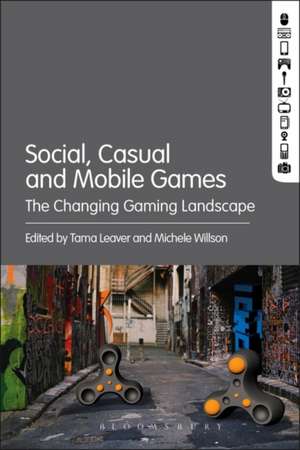Social, Casual and Mobile Games: The Changing Gaming Landscape
Editat de Michele Willson, Tama Leaveren Limba Engleză Paperback – 23 aug 2017
| Toate formatele și edițiile | Preț | Express |
|---|---|---|
| Paperback (1) | 258.77 lei 6-8 săpt. | |
| Bloomsbury Publishing – 23 aug 2017 | 258.77 lei 6-8 săpt. | |
| Hardback (1) | 833.54 lei 6-8 săpt. | |
| Bloomsbury Publishing – 6 apr 2016 | 833.54 lei 6-8 săpt. |
Preț: 258.77 lei
Preț vechi: 331.86 lei
-22% Nou
Puncte Express: 388
Preț estimativ în valută:
49.53€ • 53.82$ • 41.63£
49.53€ • 53.82$ • 41.63£
Carte tipărită la comandă
Livrare economică 21 aprilie-05 mai
Preluare comenzi: 021 569.72.76
Specificații
ISBN-13: 9781501320194
ISBN-10: 150132019X
Pagini: 288
Ilustrații: 20 bw illus
Dimensiuni: 152 x 229 x 22 mm
Greutate: 0.43 kg
Ediția:NIPPOD
Editura: Bloomsbury Publishing
Colecția Bloomsbury Academic
Locul publicării:New York, United States
ISBN-10: 150132019X
Pagini: 288
Ilustrații: 20 bw illus
Dimensiuni: 152 x 229 x 22 mm
Greutate: 0.43 kg
Ediția:NIPPOD
Editura: Bloomsbury Publishing
Colecția Bloomsbury Academic
Locul publicării:New York, United States
Caracteristici
Documents the emergence of new genres, industries, and economic frameworks, in addition to new forms of communication and sociality
Notă biografică
Michele Willson is Associate Professor and Head of Department of Internet Studies at Curtin University in Perth, Western Australia. She is the author of Technically Together: Rethinking Community within Techno-Society (2006) and co-author of A New Theory of Information and the Internet: Public Sphere meets Protocol (2006). She is Lead Investigator on Australia Research Council Linkage Grant, Online Money and Fantasy Games - an applied ethnographic study into the new entrepreneurial communities and their underlying designs. Tama Leaver is Associate Professor and Head of the Department of Internet Studies at Curtin University in Perth, Western Australia. He is the author of Artificial Culture: Identity, Technology and Bodies (2012) and co-editor of An Education in Facebook? Higher Education and the World's Largest Social Network (2014). He is also a Chief Investigator on Australia Research Council Linkage Grant, Online Money and Fantasy Games - an applied ethnographic study into the new entrepreneurial communities and their underlying designs. Details at www.tamaleaver.net.
Cuprins
Introduction: Casual Games and Mobile Devices: The Shifting Contexts of Gamers and Gaming, Michele Willson & Tama Leaver (Curtin University, Australia)Part I: The (New?) Gaming LandscapeChapter 1 - Who Are the Casual Gamers?, Lina Eklund (Stockholm University, Sweden)Chapter 2 - Between Aliens, Hackers, and Birds: Non-Casual Mobile Games and Mobile Game Design, Brendan Keogh (RMIT University, Australia)Chapter 3 - Casual Gaming: The Changing Role of the Designer, Laureline Chiapello (University of Montréal, Canada)Chapter 4 - Discussions with Developers: Free2Play and the Changing Landscape of Games Development, Tom Phillips (CREATe/University of East Anglia, UK)Part II: Reasons to PlayChapter 5 - The Sociality of Asynchronicity: Social Network Games and Family Bonding, Kelly Bourdreau & Mia Consalvo (Concordia University, Canada)Chapter 6 - The Rise of Affection Games: The Private Lives of Mobile Devices, Lindsay Grace (American University, USA)Chapter 7 - Mobile Games and Ambient Play, Larissa Hjorth (RMIT University, Australia) & Ingrid Richardson (Murdoch University, Australia)Chapter 8 - Affect and Social Value in Freemium Games, Fanny Ramirez (Rutgers University, USA)Part III: Locative PlayChapter 9 - Riding in Cars with Strangers: A Comparative Analysis of Chinese and American Teamwork in Ingress, Stacy Blasiola, Miao Feng & Adrienne Massanari (University of Illinois at Chicago, USA)Chapter 10 - COMM [secure]: Locatedness and Pseudo-Anonymity While Playing Ingress, Erin Stark (Curtin University, Australia)Chapter 11 - Rewriting Neighbourhoods: Zombies, Run! and the Runner as Rhetor, Jamie Henthorn (Old Dominion University, USA)Chapter 12 - The De-Gamification of Foursquare?, Rowan Wilken (Swinburne University of Technology, Australia)Part IV: New MarketsChapter 13 - Social Games and the Experience Economy, Mark Balnaves (University of Newcastle, Australia) & Gary Madden (Curtin University, Australia)Chapter 14 - Angry Birds as a Social Network Market, Tama Leaver (Curtin University, Australia)Chapter 15 - The Mobile Game Value Network, David Nieborg (University of Amsterdam, The Netherlands and MIT, USA)Part V. Cheating, Gambling and AddictionChapter 16 - Gambling and Addiction? Social Casino Apps and Digital Media Practices, Cesar Albarrán-Torres (The University of Sydney, Australia)Chapter 17 - Cheating in Candy Crush Saga, Marcus Carter (The University of Melbourne, Australia) & Staffan Björk (Göteborg University, Sweden)Afterword: Players and the Question of Gender After GamerGate?, Adrienne Shaw (Temple University, USA) & Shira Chess (University of Georgia, USA)BibliographyIndex
Recenzii
This book is an exciting rogue's gallery of authors, games and topics at the forefront of modern gaming. The inclusion of issues discussing not only recent developments in design, playfulness and the definition of who plays games, but also attending to the darker aspects of contemporary gaming cultures such as the transition to Freemiun, cheating and GamerGate is an important step in examining new pathways into games and gaming culture. Social, Casual and Mobile Games: The Changing Gaming Landscape demonstrates through an impressive series of chapters how this genre of games needs to be taken seriously as a cultural marker of today's players and the games they engage with.
Social, Casual and Mobile Games captures a wide array of scholarship from all corners of Game Studies. The authors explore, from a variety of empirical and theoretical perspectives, a rich tableau of games and players that often disappear from dominant narratives about what makes a game or a game player.
This terrific and timely book is an invaluable guide to the profound ways in which gaming - in all its casual, mobile, and social glory - will never be the same again. Critical research for the rest of the (gaming) world has finally arrived.
Social, Casual and Mobile Games captures a wide array of scholarship from all corners of Game Studies. The authors explore, from a variety of empirical and theoretical perspectives, a rich tableau of games and players that often disappear from dominant narratives about what makes a game or a game player.
This terrific and timely book is an invaluable guide to the profound ways in which gaming - in all its casual, mobile, and social glory - will never be the same again. Critical research for the rest of the (gaming) world has finally arrived.

